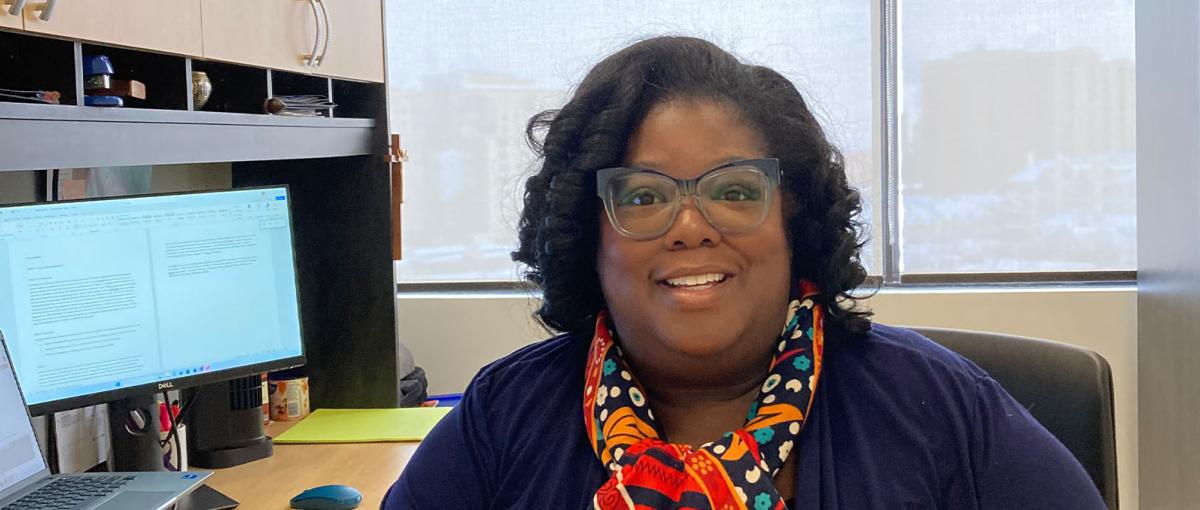Meet Rasheal Charles, corporate director, mission, spirituality and volunteerism

February 20, 2025
By Marguerite Watson, senior advisor, content
Rasheal Charles, Covenant Health’s corporate director for mission, spirituality and volunteerism, learned the importance of being inclusive at a very young age. Born and raised in Edmonton to parents from the island of Grenada, she was immersed in a heritage that stresses collaborating, bringing people together and celebrating each other. That background influences her working style today.
“(My heritage) has definitely influenced my professional journey because it’s reflected in how I approach my work,” says Rasheal. “It has allowed me to be relational in terms of building strong relationships, celebrating people's wins and appreciating different perspectives.”
A registered clinical social worker by trade, Rasheal came to Covenant Health with experience working in mental health and primary care. Her advice for young Black professionals just starting out is to “try everything.”
“Opportunities are beneficial, and signing up for everything — as much as you can get your hands into — is helpful for the future even though it might seem like it is a drift away from where you would actually like to be,” she says.
She gives an example from her experience of working with Alberta Agriculture, where she provided phone support for farmers who were going bankrupt because of drought and mad cow disease. Though the job “fell into her lap,” it was good preparation for some of the work she is doing now in spiritual care, providing a compassionate presence at Covenant Health, she says.
“The skills that I was able to gain really helped me out in my journey.”
Rasheal is a member of Covenant’s Black Advisory Body. Made up of staff and physicians who volunteer their time, it supports diversity, equity and inclusion throughout Covenant by providing feedback on programming, educational materials and initiatives like Black History Month.
For Rasheal, Black History Month has been a source of pride since she was a young girl growing up in a church whose members are mostly of Caribbean heritage. At church, the month has been a time for celebrating, sharing stories and enjoying special events.
"Black History Month has always been something that has been super exciting with lots of different things to do."
Corporate director, mission, spirituality and volunteerism
Black History Month means something different to her now as an adult, Rasheal says. “It means that there's more of an intentional way to talk about my culture, my upbringing, to those who may not understand me. It gives me a little bit of a platform to share who I am but also to learn a little bit more about my culture and history, especially here in Canada.”
Rasheal says that racial challenges or barriers weren’t part of her world while growing up. It has only been in the last five to 10 years, when she has been in leadership positions, that she has experienced these challenges. They have mostly come in the form of microaggressions — indirect, subtle and sometimes unintentional things people say that discriminate against others. With practice and by putting herself in uncomfortable situations, she has overcome them.
“It took many years to get there and to understand what a microaggression is and how to be very strategic and address those things in a way that's not going to compromise your integrity or my integrity,” she says. “It causes us to be wise and discerning about what some of those challenges or those nuances are but not to also give back what we've experienced because it's very easy to be aggressive or to be upset or not take it as a teaching opportunity with humility.”
Rasheal encourages non-racialized people to learn more about the depth of contributions Black Canadians have made to Canadian society and to support Black colleagues by making room for them to speak and be heard.
“If you recognize the racialized individual amongst your group, instead of you speaking up, give up your space, and ask them (to speak) because it's systematically built in that we are constantly discounted,” she says. “I think there needs to be an intentional way to open up space for individuals like that so they have the choice about whether they want to be more vocal. I’m grateful for colleagues who will give up their space to hear from me first.”